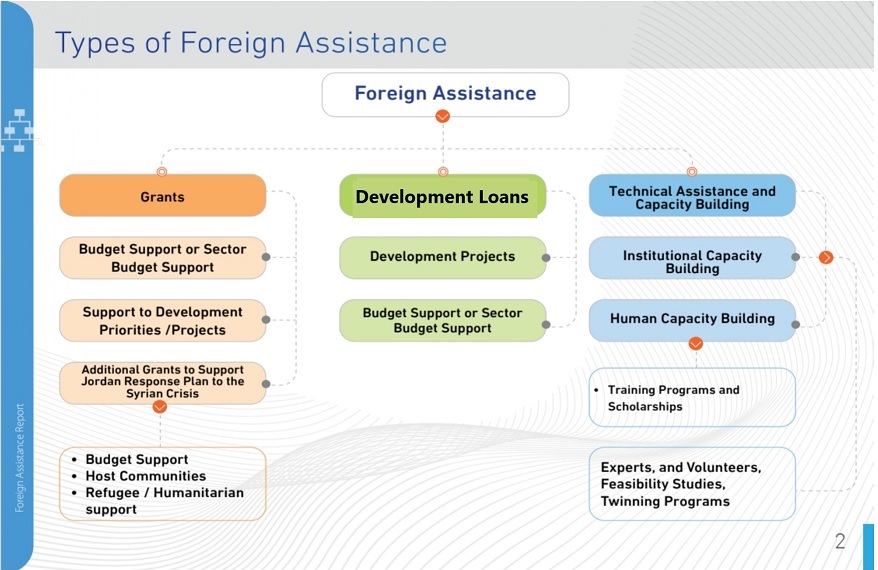The Ministry of Planning and International Cooperation serves as a liaison between ministries, governmental and private institutions, and sources of external development funding. The ministry mobilizes development aid, including grants, soft loans, and technical support, to support the implementation of national priorities and development projects across various sectors within the framework of the Economic Modernization Vision and its executive programs. This is in alignment with the political modernization pathway, the public sector modernization roadmap, and the Jordan Response Plan for the Syrian Crisis. Additionally, it provides direct support to the general budget to maintain financial and economic stability in the Kingdom. The ministry continuously strives to develop and enhance international cooperation relations between the Kingdom and its development partners.
Types of External Aid:
1. Regular and Additional Grants:
1. Grants Directed to Support the General Budget:
These are grants provided as direct support to the treasury to finance development projects and programs included in the general budget law or allocated as additional appropriations within the general budget for the budgets of ministries implementing specific sectoral projects. They are disbursed in installments based on progress or achieving contractual indicators within the financing agreements.
2. Grants Directed to Finance Priority Development Projects:
hese grants finance programs and projects within government priorities, implemented directly by the donor entity. The areas of support are agreed upon within a medium-term framework/memorandum of understanding, including the funding ceiling, areas of support, priorities, and form of assistance. Details of the programs and projects are coordinated with the concerned ministries and sectoral institutions.
3. Additional Grants to Support the Jordan Response Plan for the Syrian Crisis:
The Jordan Response Plan for the Syrian Crisis is the government's main reference document for responding to the humanitarian needs of refugees and the needs of host communities. Financing the plan provides additional support to the Kingdom across its various components.
2. Concessional Loans:
This funding comes in the form of borrowing to implement priority development and capital projects under favorable financing conditions, including low-interest rates and long repayment periods, with grace periods included.
3. Technical Support and Capacity Building:
Donors and financing entities provide technical assistance to the Kingdom to build and enhance the institutional and technical capacities of various ministries and governmental institutions. This assistance is provided in the form of studies, technical experts, volunteers, twinning projects, equipment and supplies, training programs, academic missions, university scholarships, cultural exchanges, and more.
All grants, loans, and technical support projects are subject to oversight by various state bodies, including internal oversight, financial oversight, the Audit Bureau, and parliamentary oversight. Additionally, they are monitored by donor and funding entities through their specialized oversight bodies or external audit missions.

To download and view the Foreign Assistance Reports Please click here